1
Under torture you are as if under the dominion of those grasses that produce visions. Everything you have heard told, everything you have read returns to your mind, as if you were being transported, not toward heaven, but toward hell. Under torture you say not only what the inquisitor wants, but also what you imagine might please him, because a bond (this, truly, diabolical) is established between you and him .. These things I know, Ubertino; I also have belonged to those groups of men who believe they can produce the truth with white-hot iron. Well, let me tell you, the white heat of truth comes from another flame.Umberto Eco
2
After so many years even the fire of passion dies, and with it what was believed the light of the truth. Who of us is able to say now whether Hector or Achilles was right, Agamemnon or Priam, when they fought over the beauty of a woman who is now dust and ashes?Umberto Eco
3
I did not know then what Brother William was seeking, and to tell the truth, I still do not know today, and I presume he himself did not know, moved as he was solely by the desire for truth, and by the suspicion - which I could see he always harbored - that the truth was not what was appearing to him at any given moment.Umberto Eco
4
The older I grow and the more I abandon myself to God's will, the less I value intelligence that wants to know and will that wants to do; andas the only element of salvation I recognize faith, which can wait patiently, without asking too many questions.Umberto Eco
5
There are magic moments, involving great physical fatigue and intense motor excitement, that produce visions of people known in the past ("en me retraçant ces détails, j'en suis à me demander s'ils sont réels, ou bien si je les ai rêvés"). As I learned later from the delightful little book of the Abbé de Bucquoy, there are also visions of books as yet unwritten.Umberto Eco
6
In the years when I discoverd the Abbé Vallet volume, there was a widespread conviction that one should write only out of a commitment to the present, in order to change the world. Now, after ten years or more, the man of letters (restored to his loftiest dignity) can happily write out of pure love of writing.Umberto Eco
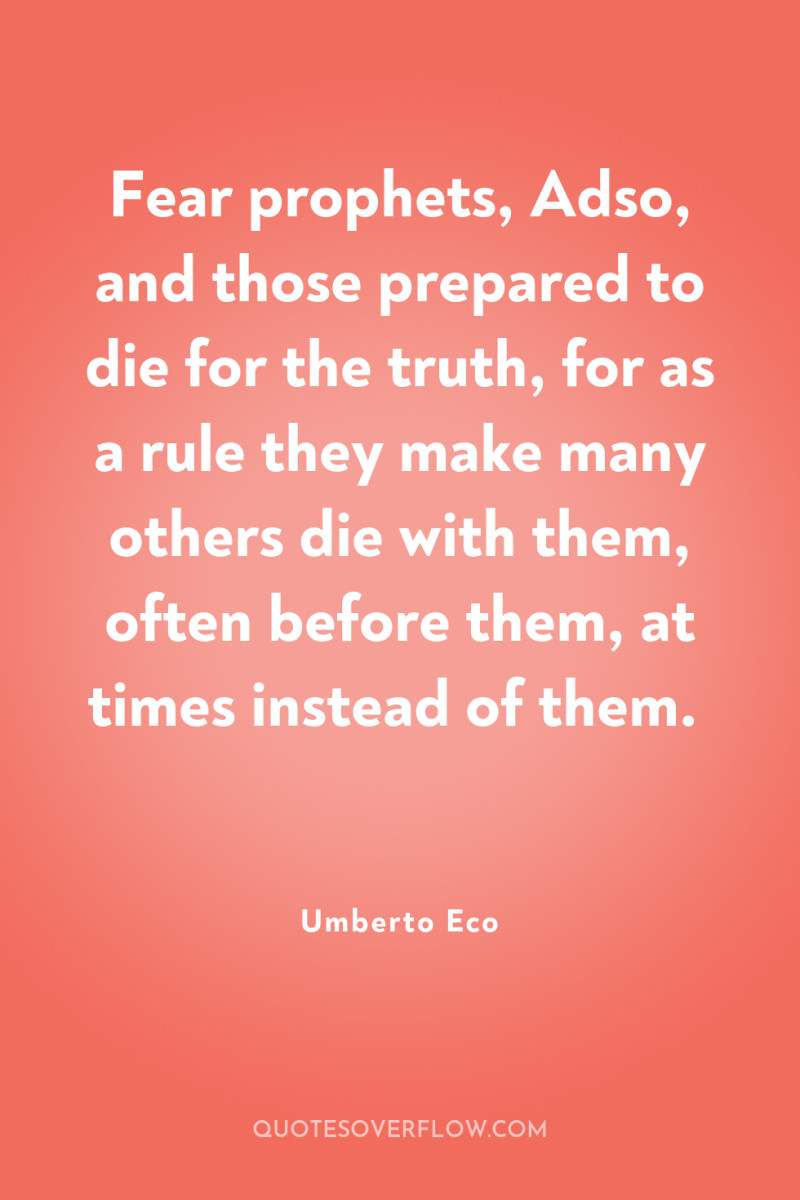
7
Fear prophets, Adso, and those prepared to die for the truth, for as a rule they make many others die with them, often before them, at times instead of them.Umberto Eco
8
In that face, deformed by hatred of philosophy, I saw for the first time the portrait of the Antichrist, who does not come from the tribe of Judas, as his heralds have it, or from a far country. The Antichrist can be born from piety itself, from excessive love of God or of the truth, as the heretic is born from the saint and the possessed from the seer. Fear prophets, Adso, and those prepared to die for the truth, for as a rule they make many others die with them, often before them, at times instead of them. Jorge did a diabolical thing because he loved his truth so lewdly that he dared anything in order to destroy falsehood. .Umberto Eco
9
El diablo no es el prÃncipe de la materia, el diablo es la arrogancia del espÃritu, la fe sin sonrisa, la verdad jamás tocada por la duda.Umberto Eco
10
But is the unicorn a falsehood? It's the sweetest of animals and a noble symbol. It stands for Christ and for chastity; it can be captured only by setting a virgin in the forest, so that the animal, catching her most chaste odor, will go and lay its head in her lap, offering itself as prey to the hunters' snares."" So it is said, Adso. But many tend to believe that it's a fable, an invention of the pagans."" What a disappointment, " I said. "I would have liked to encounter one, crossing a wood. Otherwise what's the pleasure of crossing a wood? .Umberto Eco
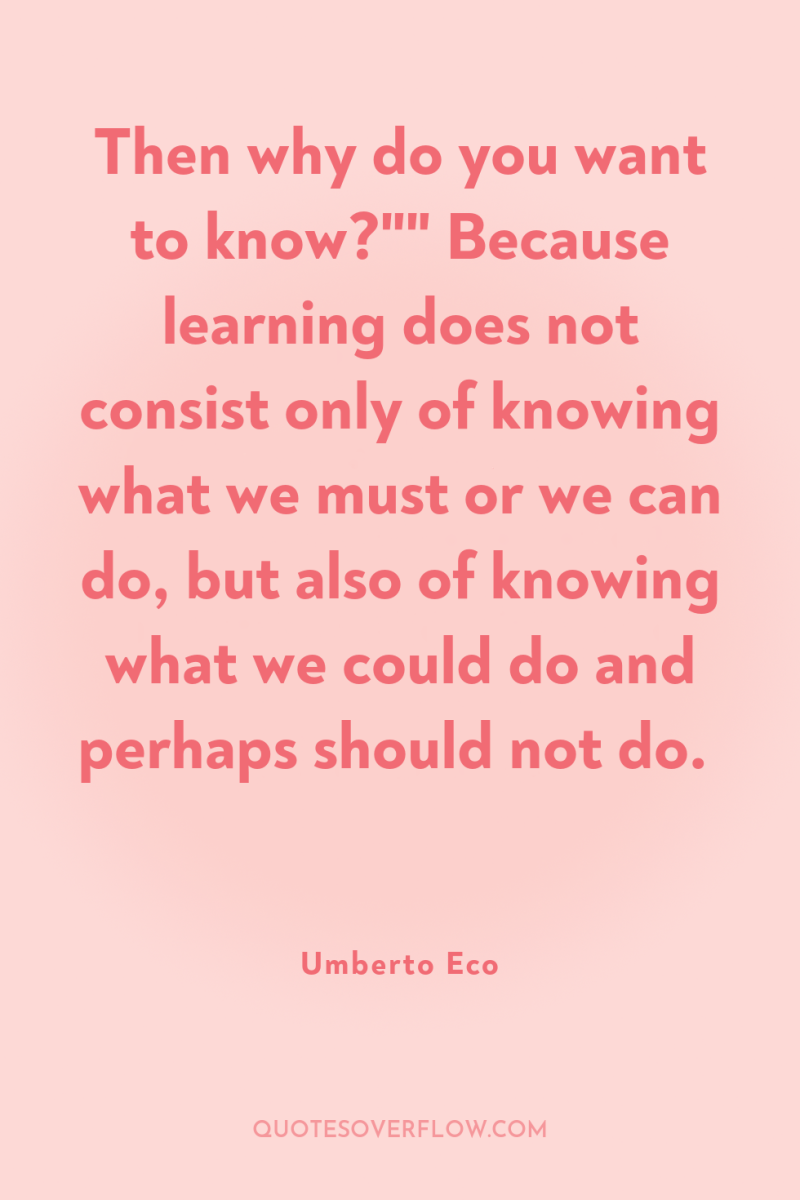
11
Then why do you want to know?"" Because learning does not consist only of knowing what we must or we can do, but also of knowing what we could do and perhaps should not do.Umberto Eco
12
A monk should surely love his books with humility, wishing their good and not the glory of his own curiosity; but what the temptation of adultery is for laymen and the yearning for riches is for secular ecclesiastics, the seduction of knowledge is for monks.Umberto Eco
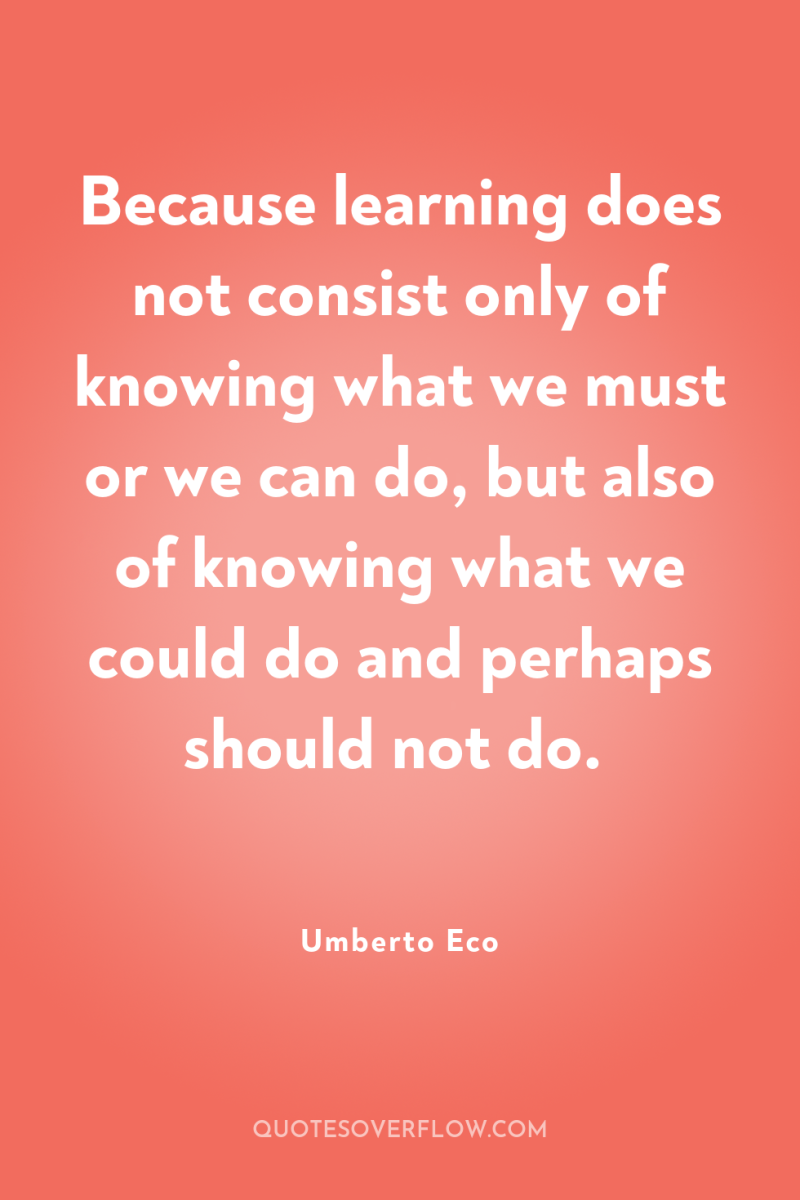
13
Because learning does not consist only of knowing what we must or we can do, but also of knowing what we could do and perhaps should not do.Umberto Eco
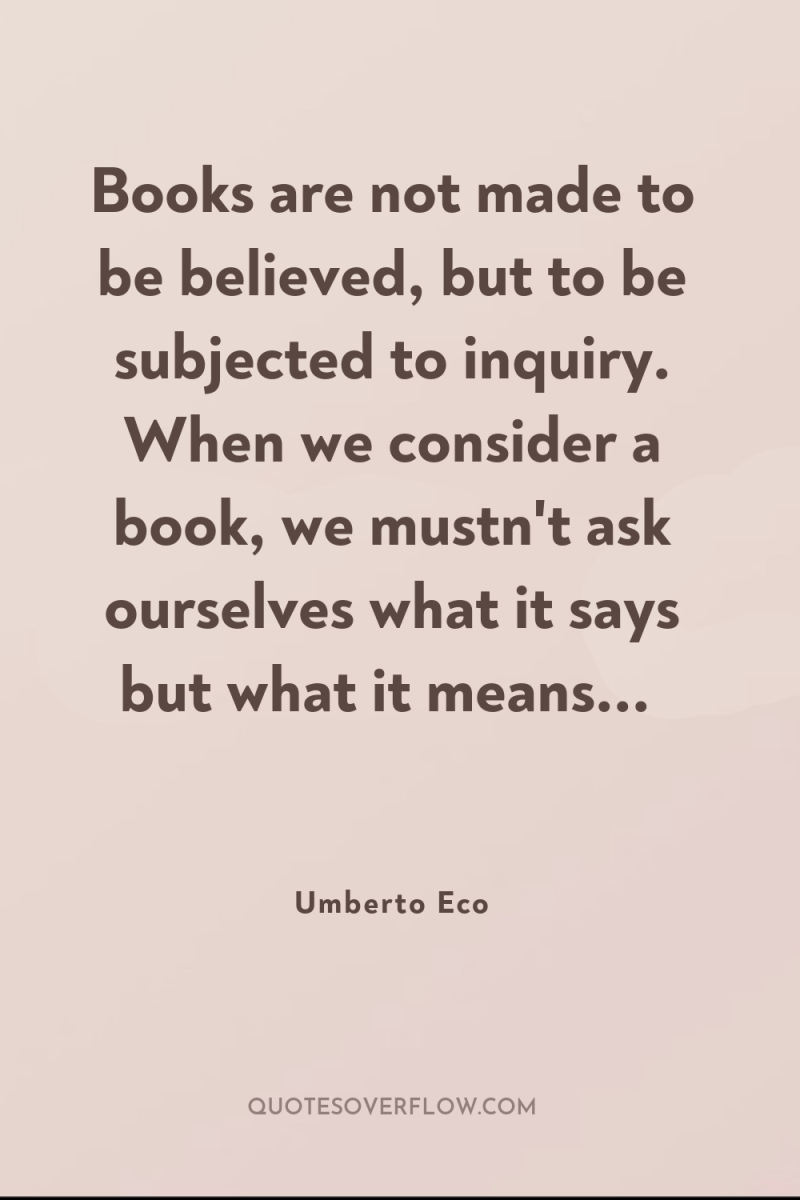
14
Books are not made to be believed, but to be subjected to inquiry. When we consider a book, we mustn't ask ourselves what it says but what it means...Umberto Eco
15
Until then I had thought each book spoke of the things, human or divine, that lie outside books. Now I realized that not infrequently books speak of books: it is as if they spoke among themselves. In the light of this reflection, the library seemed all the more disturbing to me. It was then the place of a long, centuries-old murmuring, an imperceptible dialogue between one parchment and another, a living thing, a receptacle of powers not to be ruled by a human mind, a treasure of secrets emanated by many minds, surviving the death of those who had produced them or had been their conveyors. .Umberto Eco
16
A book is a fragile creature, it suffers the wear of time, it fears rodents, the elements and clumsy hands. so the librarian protects the books not only against mankind but also against nature and devotes his life to this war with the forces of oblivion.Umberto Eco
17
..a book is a fragile creature, it suffers the wear of time, it fears rodents, the elements, clumsy hands. If for a hundred and a hundred years everyone had been able freely to handle our codices, the majority of them would no longer exist. So the librarian protects them not only against mankind but also against nature, and devotes his life to this war with the forces of oblivion, the enemy of truth.Umberto Eco
18
We stopped to browse in the cases, and now that William - with his new glasses on his nose - could linger and read the books, at every title he discovered he let out exclamations of happiness, either because he knew the work, or because he had been seeking it for a long time, or finally because he had never heard it mentioned and was highly excited and titillated. In short, for him every book was like a fabulous animal that he was meeting in a strange land.Umberto Eco

19
Nothing gives a fearful man more courage than another's fear.Umberto Eco
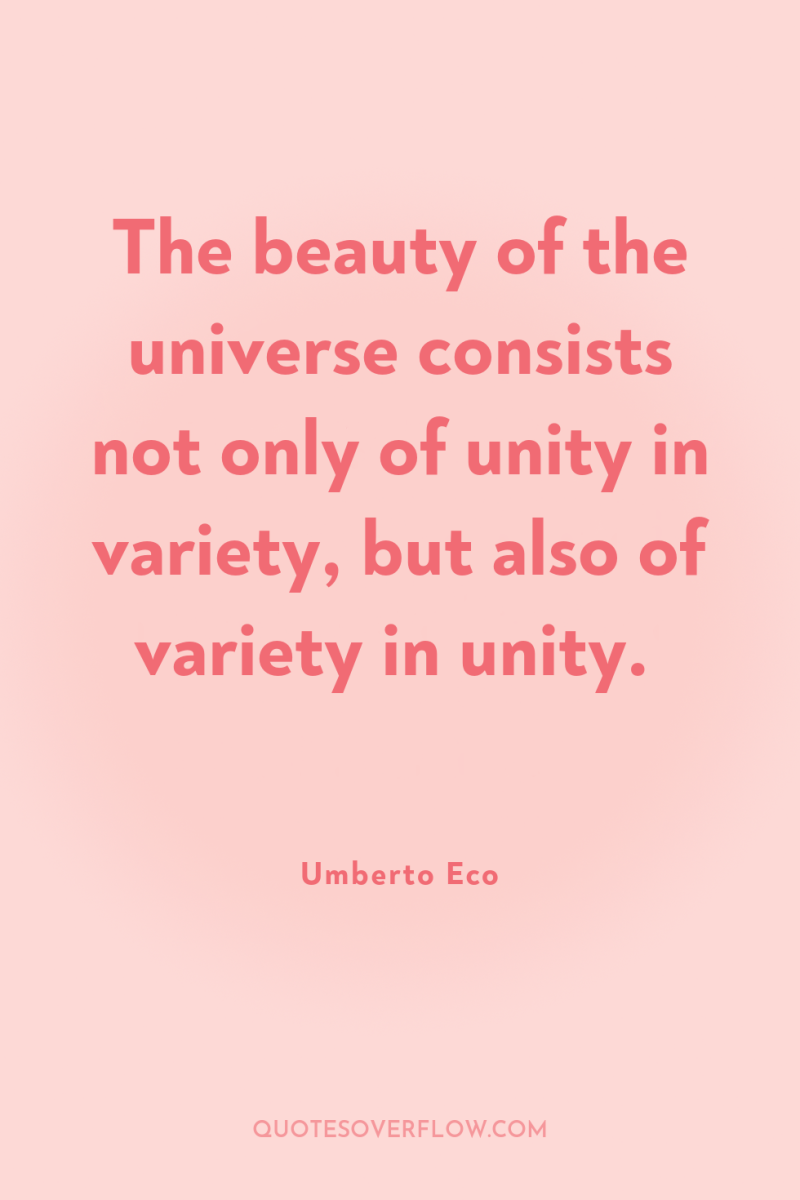
20
The beauty of the universe consists not only of unity in variety, but also of variety in unity.Umberto Eco
21
I say that many of these heresies, independently of the doctrines they assert, encounter success among the simple because they suggest to such people the possibility of a different life. I say that very often the simple do not know much about doctrine. I say that often hordes of simple people have confused Catharist preaching with that of the Patarines, and these together with that of the Spirituals. The life of the simple, Abo, is not illuminated by learning and by the lively sense of distinctions that makes us wise. And it is haunted by illness and poverty, tongue-tied by ignorance. Joining a heretical group, for many of them, is often only another way of shouting their own despair. You may burn a cardinal’s house because you want to perfect the life of the clergy, but also because you believe that the hell he preaches does not exist. .Umberto Eco
22
But why do some people support [the heretics]?" "Because it serves their purposes, which concern the faith rarely, and more often the conquest of power." "Is that why the church of Rome accuses all its adversaries of heresy?" "That is why, and that is also why it recognizes as orthodoxy any heresy it can bring back under its own control or must accept because the heresy has become too strong.Umberto Eco
23
Scratch the heresy and you will find the leper. Every battle against heresy wants only this: to keep the leper as he is.Umberto Eco
24
The order that our mind imagines is like a net, or like a ladder, built to attain something. But afterward you must throw the ladder away, because you discover that, even if it was useful, it was meaningless.Umberto Eco
25
The faith a movement proclaims doesn't count: what counts is the hope it offers. All heresies are the banner of a reality, an exclusion. Scratch the heresy and you will find the leper. Every battle against heresy wants only this: to keep the leper as he is.Umberto Eco
26
For centuries, as pope and emperor tore each other apart in their quarrels over power, the excluded went on living on the fringe, like lepers, of whom true lepers are only the illustration ordained by God to make us understand this wondrous parable, so that in saying 'lepers' we would understand 'outcast, poor, simple, excluded, uprooted from the countryside, humiliated in the cities.' But we did not understand; the mystery of leprosy has continued to haunt us because we have not recognized the nature of the sign.Umberto Eco
27
The devil is not the prince of matter; the devil is the arrogance of spirit, faith without smile, truth that is never seized by doubt. The devil is grim because he knows where he is going, and, in moving, he always returns from whence he came.Umberto Eco
28
He is, or has been, in many ways a great man. But for this very reason he is odd. It is only petty men who seem normal.Umberto Eco
29
I dared, for the first and last time in my life, to express a theological conclusion: "But how can a necessary being exist totally polluted with the possible? What difference is there, then, between God and primogenial chaos? Isn't affirming God's absolute omnipotence and His absolute freedom with regard to His own choices tantamount to demonstrating that God does not exist?Umberto Eco
30
The monkish vows keep us far from that sink of vice that is the female body, but often they bring us close to other errors. Can I finally hide from myself the fact that even today my old age is still stirred by the noonday demon when my eyes, in choir, happen to linger on the beardless face of a novice, pure and fresh as a maiden's?Umberto Eco
31
But it has often happened that I have found the most seductive depictions of sin in the pages of those very men of incorruptible virtue who condemned their spell and their effects.Umberto Eco
32
And what would we be, we sinful creatures, without fear, perhaps the most foresighted, the most loving of the divine gifts?Umberto Eco
33
Until then I had thought each book spoke of the things, human or divine, that lie outside books. Now I realized that not infrequently books speak of books: it is as if they spoke among themselves. In the light of this reflection, the library seemed all the more disturbing to me. It was then the place of a long, centuries -old murmuring, an imperceptible dialogue between one parchment and another, a living thing, a receptacle of powers not to be ruled by a human mind, a treasure of secrets emanated by many minds, surviving the death of those who had produced them or had been their conveyors. .Umberto Eco
34
The people of God cannot be changed until the outcasts are restored to its body.Umberto Eco
35
Daytime sleep is like the sin of the flesh; the more you have the more you want, and yet you feel unhappy, sated and unsated at the same time.Umberto Eco
36
The outcast lepers would like to drag everything down in their ruin. And they become all the more evil, the more you cast them out; and the more you depict them as a court of lemurs who want your ruin, the more they will be outcast.Umberto Eco
37
The print does not always have the same shape as the body that impressed it, and it doesn't always derive from the pressure of a body. At times it reproduces the impression a body has left in our mind: it is the print of an idea.Umberto Eco
38
The list could surely go on, and there is nothing more wonderful than a list, instrument of wondrous hypotyposis.Umberto Eco
39
William made an ejaculation in his own language that I didn't understand, nor did the abbot understand it, and perhaps it was best for us both, because the word William uttered had an obscene hissing sound.Umberto Eco
40
Then we are living in a place abandoned by God, " I said, disheartened." Have you found any places where God would have felt at home?" William asked me, looking down from his great height.Umberto Eco